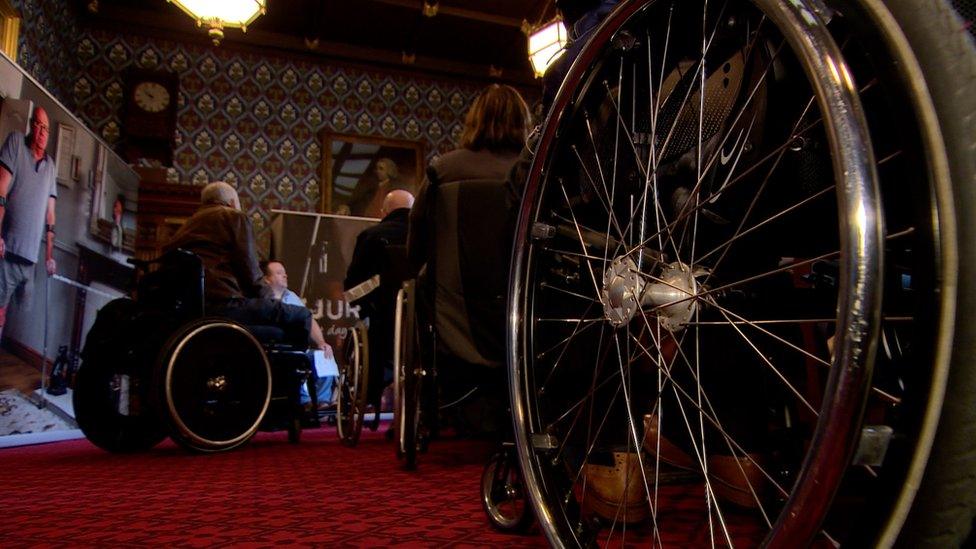Troubles pension: Three legal challenges over delay to scheme
- Published

Payments to people physically injured or traumatised had been due to commence on 29 May
The Executive Office is facing three legal challenges over the failure to implement a planned Troubles pension, a committee has heard.
Some victims' groups said they would seek leave for a judicial review after applications could not open in May.
Hearings against the Executive Office are set for the week of 17 August, a civil servant has said.
Confusion also remains over which Stormont department will operate the scheme.
The DUP and Sinn Féin remain at odds over the scheme's eligibility criteria, and they both argue that Westminster should be funding the pension, rather than Stormont.
NI Secretary Brandon Lewis has insisted the cost - estimated to be at least £100m in its first three years - rests with Stormont.
Appearing before the Executive Office committee on Wednesday, civil servant Gareth Johnston said the department had been emphasising through its legal counsel that "active efforts" were being made to try and resolve funding at both an official and ministerial level.
"The timetable they're looking towards is hearings in the week of 17 August, but there is a lot of exchanging of arguments that needs to happen before then," he added.
Asked by Ulster Unionist assembly member Doug Beattie how many legal cases the executive office was dealing with, he said: "There have been a couple of preliminary hearings the court has held so far in focusing on two cases - but a third one will be joining."
'No agreement' on draft guidelines
The pension was agreed in 2014 and signed into legislation in January 2020.
A department must be designated to administer the scheme but so far this has not been signed off, although last week the executive set aside £2.5m in funding to support preparatory work for the pension.
The roots of Northern Ireland’s Troubles lie deep in Irish history
Justice Minister Naomi Long offered her department to run the scheme, so long as all the necessary funding was put in place for it.
But Deputy First Minister Michelle O'Neill has resisted approving a department, as her party objects to the eligibility rules.
They state "a relevant conviction" or "exceptional circumstances" could make a person's entitlement to payments "inappropriate".
Sinn Féin has argued they go beyond what is in legislation.
The Northern Ireland Office (NIO) disagrees and along with the DUP, have criticised Sinn Féin for blocking progress.
Draft guidelines for the pension were due to be agreed and made public last month, but civil servant Mark Browne told the committee that there was still "no agreement" between the parties and no timeframe for the guidelines to be published.

What is the Troubles pension?
It was drawn up in 2019 by the UK government, when the Stormont assembly was not functioning.
The Troubles claimed more than 3,500 lives and the Northern Ireland Office has estimated another 40,000 people were injured.
The scheme aims to provide pension-like payments to victims of the Troubles, every year for the rest of their lives, with payments ranging from £2,000 to £10,000.
Victims will be eligible to apply if they were injured in an incident at any point between 1 January 1966 and 12 April 2010, the date that responsibility for policing and justice was devolved to Stormont.
The scheme will be open to those injured anywhere in the UK - no matter where they are from - and to those who normally reside in the UK but were injured anywhere in the world as a result of the Troubles.
- Published25 June 2020

- Published24 June 2020

- Published7 June 2020

- Published5 June 2020
